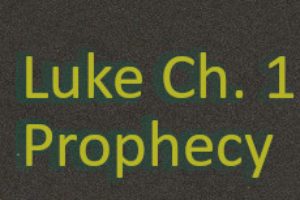We are just over a quarter of the way through the Gospel of Luke. Hopefully you’re still sticking with us and finding this challenge a blessing. It is so wonderful to see the life of Jesus Christ unfold before us, right before Christmas. We are on day 7 and chapter 7, and today I want to spend some time looking at the account of the centurion and his servant. It is important to note that the account of this miracle is different than other accounts. Luke will hardly mention the miracle itself. Instead, he will focus on the faith of the centurion.
This is a powerful testimony that provides an opportunity to us to see the different backgrounds of people that respond to the message of Jesus Christ. It is important to note a little background of the centurion. He would have been a soldier in the army of Herod Antipas. He would have also been a commander over about one hundred men. We see that he has authority by his own self-description in Luke 7:8. It is possible that he served as a tax solider or some sort of policeman. Some wonder if the man was a proselyte, given his support for the synagogue. While that is a possibility, we cannot know for certain. What is clear is that he supported the Jewish nation.
The centurion had heard about Jesus and His miracles. Since he is a Gentile, and knows the Jewish culture, he sends a delegation of Jewish leaders to plead on his behalf to have his servant healed. He knew that for a Jew to enter the home of a Gentile would render him ceremonially unclean. This would have been a huge inconvenience for a man like Jesus. The Jews though that it would be worth-while for Jesus to become unclean to meet the request of this Gentile. However, when the centurion knew that Jesus was coming, he responds with a humble opinion. “Lord, do not trouble yourself, for I am not worthy to have you come under my roof.” He did not think he was worth while for Jesus to become unclean to do this request. Instead of that, the man acts in faith and says: “just say the word, and let my servant be healed.”
The Focus of the Account
The miracle itself is not the focus. It is very briefly mentioned in Luke 7:10. However, the stress is on the attitude of the one seeking the healing. Luke will shift his attention from the miracle to the centurion and his response to Jesus. Luke is showing us that Jesus is more than a teacher or healer. This man sends a request to the Lord and hopes He will respond. When He does respond to the request, the man acts in faith.
What is our faith like response to the message of Jesus?
When we pray, do we make demands of God or simply make requests? We need to understand that our prayers and requests will sometimes be met with a “no” from God as well. Our prayers need to be made in line with God’s will for our lives. And His will is that we should fear God and obey His commands.
Studying the Word of God
It is interesting to point out the cultural sensitivity that the Centurion had. He knew the culture of the Jews and responded to it accordingly. When we look at the life of Jesus, the epistles, or other books in the Bible, do we take it in the historical, grammatical, literal since. Or do we read the Bible with our modern eyes, our modern brain and try to apply modern interpretations where one is not warranted. Doing so can lead to false doctrines, like replacement theology, or kingdom now. These are lies that they only way to come to them as a conclusion is to take the Biblical writings out of context and allegorically interpret them.
The Messiah to the World
The other aspect of this account is that it is a foreshadow of the spread of the Gospel to the Gentile world. Luke seems to be trying to help the church of his day to understand how the inclusion of Gentiles into the church was envisioned by Jesus during His earthly ministry. This account illustrates the blessings that come under the Abrahamic Covenant from Genesis 12:3. This gentil is a picture of how the Gentiles at large would accept Jesus as the Messiah, while the nation of Israel will reject Him. This is not that Gentiles replace the Jews, but that they are included along with the Jews under the Messiah.
Essentially, all racial, economic, gender, and other inequalities are removed in Christ. While Jesus will initially preach to the lost sheep of Israel, his ministry and message will expand to the entire world. With God there are only two races, Jew and Gentile. Under the Messiah there is only one. I love how Paul gives us this picture in Galatians 3:28:
There is neither Jew nor Greek, there is neither slave nor free, there is no male and female, for you are all one in Christ Jesus
Galatians 2:38 ESV
Eventually, we will all stand before the Lord on the day of Judgement. When we do, nothing about our person, or how “good” we lived our lives will matter. We will all stand equally before the Lord. All of us are sinners before Him. And the judgement of sin is death, or eternal separation from God. However, God, in His mercy has provided a way for us to receive forgiveness. That is to:
- Admit you are a sinner (we ALL are) and in need of God’s forgiveness
- Believe that Jesus Christ lived the perfect, sinless life. That He died on the cross to take away your sins. That He was buried and rose again on the third day.
- Call upon His name! Confess your faith in Jesus Christ for the fogginess of your sins.
…if you confess with your mouth that Jesus is Lord and believe in your heart that God raised him from the dead, you will be saved.
Romans 10:9 ESV
You don’t want to be standing in front of the Judge without having a personal relationship with Jesus Christ.





